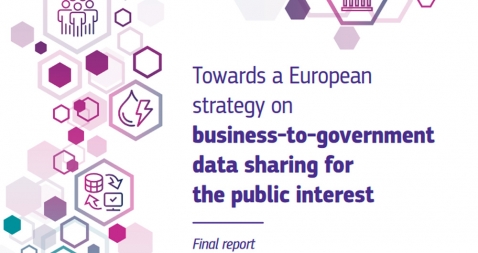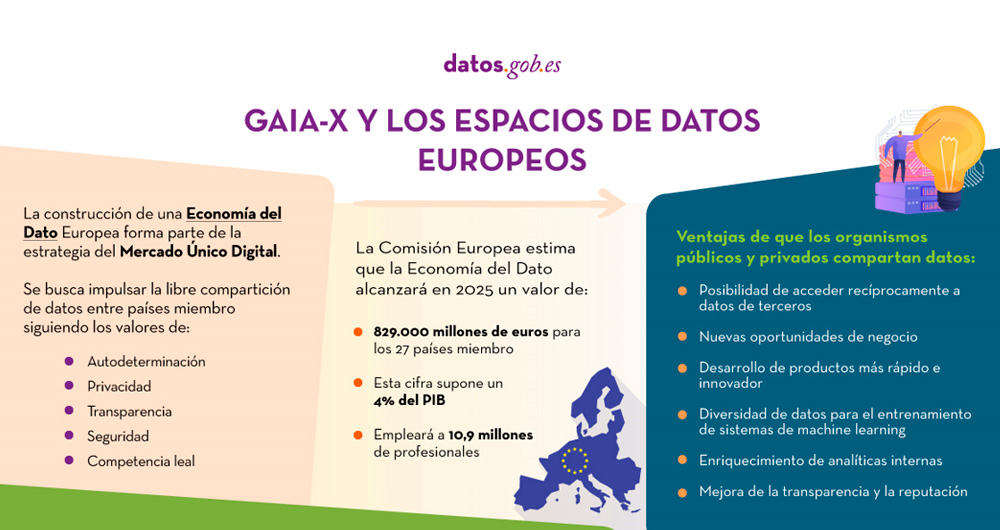Recommendations for a better use of private data in the European Union
Fecha de la noticia: 11-05-2022

In the framework of european data strategy, one of the issues on which the European Commission is working is to facilitate the exchange of data held by companies with the administrations to improve public services and guide policy decisions. According to the Commission's own definition, theB2G data exchange it is a collaboration in which a company or other private organization makes its data (or knowledge) available to the public sector (local, regional, national or EU) for a purpose of public interest.
In order to obtain legal advice, identify good practices and collect recommendations for its policies, in 2018, the European Commission appointed a group of high-level independent experts with experience in the public and private sector in the field of B2G data exchange. The conclusions and recommendations of the group to the Commission were included in a report final which has been used to advise possible Commission initiatives on this matter.
The report recognizes that much of the potential of data and knowledge, so that they can be used for the benefit of society, still unexploded. Organizational, technical, and legal obstacles, as well as a general lack of a data-sharing culture, are among the causes that make most current collaborations ad hoc. The report provides a detailed description of the barriers to collaboration and proposes a comprehensive framework of policy, legal, and funding recommendations to enable scalable, responsible, and sustainable B2G data sharing in the public interest. A good number of examples of European B2G collaborations that have been used in the analysis methodology and that are generally little known even to the most specialized public are also included.
The most interesting part perhaps lies in the key recommendations that are made to the European Commission and a Member States to consider data as critical public infrastructure for the future of the EU and take action accordingly to facilitate the use of private data for the public interest.
These recommendations are structured in three main categories that refer to the governance of exchanges, the transparency of said exchanges and the tools that facilitate exchanges. Specific measures are suggested for each of them.
Governance of B2G data exchange across the EU
The first recommendation made by the report is that all Member States establish governance structures that can monitor and provide advice on responsible B2G data sharing practices. Additionally, and in order to support this idea, it is recommended that private, public and civil society organizations promote the function of data administrator and that the European Commission encourage the creation of a network of such data managers, as a community of practice in the field.
The European Commission is further asked to explore the creation of an EU regulatory framework to facilitate the re-use by the public sector of privately owned data for the public interest. It is proposed that this framework include data sharing requirements, transparency requirements and safeguards, without imposing new obligations on the private sector to collect additional data.
Recommendations are also made regarding the application of reference conditions (including, in some cases, free conditions) applicable to the acquisition of privately owned data for purposes of public interest in accordance with the B2G data exchange principles.
Transparency, citizen participation and ethics in the exchange of B2G data
The first recommendation in this category is that B2G data collaborations between public, private, and civil society organizations should be transparent, including regarding the data used and the impact of the collaborations.
The recommendations also focus on the need for Member States and the European Commission to raise citizens' public awareness of the societal benefits of data (for example, by initiating data literacy programs) and to involve the general public in the choice of societal challenges to be addressed. This line of action calls on Member States to promote user-friendly data donation mechanisms and encourage the general public to share your data for the public interest purposes of your choice. In this sense, his own EU data portal acknowledges in a recently published report the enormous gaps, as well as the great opportunities, in relation to the publication of data generated by citizens.
The experts do not forget to remind the European Commission of the need to develop ethical guidelines on the use of data, including for the public interest and, where appropriate, taking into account the European Union Ethical Guidelines for Artificial Intelligence.
Finally, Member States are asked to invest in the training, education and up-skilling of policy makers and public sector workers to increase the readiness and operational capacity of the public sector to use and act on data.
Operating models, structures and technical tools to facilitate data exchange
Experts propose that the European Commission and Member States put in place incentives for B2G data sharing and mechanisms that ensure public recognition of private companies and civil society organizations involved in B2G data sharing.
Experts consider the programs of the new financial framework 2021-2027 and in particular the Digital Europe Program and the Horizon Europe Program as key pieces to implement the recommendations. Firstly, to finance the development and deployment of technologies (privacy preservation, security technologies and access control technologies) that favor B2G data exchange at scale and in a responsible and sustainable manner. But also, to promote the creation of a light governance structure that prioritizes standards that allow reducing the transaction costs of B2G data exchange and guaranteeing interoperability.
Finally, the European Commission is asked to carry out studies to obtain further empirical evidence of the macroeconomic and social benefits of B2G data sharing for the public interest.
In short, the EU seems determined to promote B2G collaborations by creating a common framework that allows the development of fast, responsible and sustainable B2G data exchange. And the list of areas in which the exchange of B2G data can have a great impact on the lives of citizens is endless: making health services be more efficient, improve the diagnosis of diseases in the population, react faster in emergencies and natural or humanitarian disasters, allow public research institutes access to data for the development of ethical artificial intelligence services, save energy for a more sustainable society, improve mobility, develop smarter cities, etc.
Content written by Jose Luis Marín, Senior Consultant in Data, Strategy, Innovation & Digitalization.
The contents and views reflected in this publication are the sole responsibility of the author.














